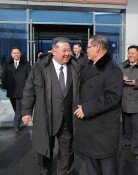[Editorial] A President Concerned With the Past; A Public Worried About the Future
[Editorial] A President Concerned With the Past; A Public Worried About the Future
Posted August. 17, 2005 06:27,
President Roh said yesterday in a meeting with presidential aides and advisors that history lives in the present and will live in the future. Future norms come from past assessments. By doing so, he once again expressed his case for calling for legislation to nullify the statue of limitations of crimes related to the abuse of public authority in his Liberation Day speech, and he once again made cleaning up past wrongdoings a national agenda. It seems that his focus on clearing past wrongdoings has reached the point where compromise is impossible, despite the doubts.
Many previous administrations have tried to clean up past wrongdoings to differentiate their administrations from those that came before them. But no administration has been as dedicated to this as President Rohs, whose administration has been obsessed with the past during his two-and-a-half years in office. In 1980, the new military administration chanted the slogan: Clean up the legacy of Japanese colonial rule and revitalize the reform period. The Roh Tae-woo administration emphasized, cleaning up the Fifth Republic. The Kim Young-sam administration emphasized, establishing historical facts. The Kim Dae-jung administration emphasized, reconciliation with the past. However, they all soon turned their eyes to livelihood. That was because they learned a common lesson from history that historical assessments of an administration are dependent upon how much they contribute to improving their peoples quality of life and national strength.
History Does Not Feed Us-
The past is not to be cleared up and destroyed. It has meaning when it contributes to building the future. In this regard, it is extremely degenerative for our nation, 60 years after its liberation, to be obsessed with an agenda based on the past instead of the future. Laws on reputation restoration and compensation for democracy movement activists were already enacted under the Kim Dae-jung administration. A special law on investigation into pro-Japanese acts during the Japanese occupation and a basic law on truth and reconciliation of the past were made under the current administration. Based on these laws, the National Intelligence Agency, the police, and the Ministry of Defense are operating their own councils on establishing historical facts.
Under the circumstances, President Rohs remark on the retroactive law to clear up past wrongdoings that even risks being blamed for its unconstitutionality cannot be considered to be without political intentions. That explains why some analyze that Rohs attempt is politically motivated for the interests of his administration and party.
According to what he said, the two-and-a half years of the current administration are a living past. His report card is horrible as seen by his approval rating that plummeted to about 20 percent, and the drop in support for the ruling party to about 10 percent. An administrations performance is mainly judged by how the economy and its people are doing. It is a pervasive view that the economy is still going because industries in the country continuously blamed by President Roh have done well so far.
In addition, President Roh is playing politics above the law. He has made remarks that cannot be expected of a guardian of the Constitution. Two years ago, his remarks made in violation of election law led to a vote of no confidence and a judgment on his impeachment.
It Is Time to Talk of National Measures-
The problem is that there doesnt seem to be an organization to take the place of the president and the ruling partys erroneous national agenda that is planning and presenting blueprints for the future. The ruling party, which is pivotal in managing national affairs, has shown only a follow what Cheong Wa Dae says attitude, from the controversial abolition of the National Security Law to the recent upheaval over the idea of a coalition government. The controversy over reform and practicality has vanished. This scene is a carbon copy of the ruling party heeding the presidents word during the authoritarian times of the past.
However, it is our judgment that the opposition party is just as responsible, if not more so, for not being able to present measures for a brighter future. The Grand National Party has not presented a proper impartial opinion whenever an issue has occurred, and has been rushing about within the agenda that the president and ruling party have presented. This is exemplified by the situation regarding President Rohs proposal to probe into the nations modern history in which the GNP has only been concentrating on asking, What are they up to? On the issue to reveal wiretapping by the nations intelligence agency, the GNP has been busy involving itself in political strife, proposing a bill for a special prosecutor to investigate the case, which has as many unconstitutional factors as the ruling partys bill for a special law.
In front of Korea lies the task of becoming a developed country and constructing the basis for unification to complete the countrys unfinished liberation. The country must also work on developing the relationships with its neighbors in Northeast Asia to guarantee the countrys future.
The idea that the people should no longer be dragged along with the agenda planning of the president and the ruling party, who are busy probing into history and the past, is spreading. Now is the time when every member of national society, the political circle, civic groups, and the people should begin a discussion and talk this matter over. We do not have much time left.




![[단독]임성근, 4차례 음주운전 적발…99년 집행유예 기간 중 무면허 음주 적발](https://dimg.donga.com/c/138/175/90/1/wps/NEWS/IMAGE/2026/01/20/133195400.1.png)


